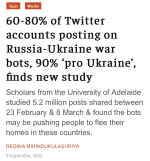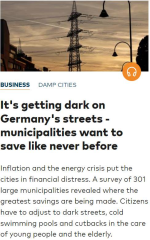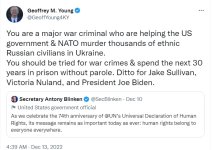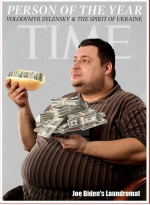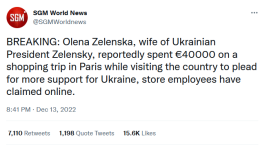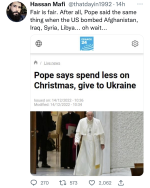You are using an out of date browser. It may not display this or other websites correctly.
You should upgrade or use an alternative browser.
You should upgrade or use an alternative browser.
Welcome to the Precious Metals Bug Forums
Welcome to the PMBug forums - a watering hole for folks interested in gold, silver, precious metals, sound money, investing, market and economic news, central bank monetary policies, politics and more.
Why not register an account and join the discussions? When you register an account and log in, you may enjoy additional benefits including no Google ads, market data/charts, access to trade/barter with the community and much more. Registering an account is free - you have nothing to lose!
Viking
Yellow Jacket
Had to change my VPN to Japan to view that. But when I go to link, says it again says it violated local laws. ?
- Messages
- 15,764
- Reaction score
- 10,087
- Points
- 288
I had that appear on Telegram, but when I copied the link (right click 'copy') and pasted it here, it somehow showed up as the valid link.
searching the net on the title found this

Kiev Continues Crackdown on Ukrainian Orthodox Church
Kiev’s domestic security service has launched a new series of raids targeting the church over its alleged links to Russia
www.newswars.com
cheka
Ground Beetle
cheka
Ground Beetle
- Messages
- 15,764
- Reaction score
- 10,087
- Points
- 288
Exclusive: US finalizing plans to send Patriot missile defense system to Ukraine

By Barbara Starr, CNN Pentagon Correspondent
Updated 12:19 PM EST, Tue December 13, 2022

The Army test fires a Patriot missile in 2019. The Patriot missile defense systems are designed to counter and destroy incoming short-range ballistic missiles, advanced aircraft and cruise missiles.
Jason Cutshaw/US Army
CNN —
The Biden administration is finalizing plans to send the Patriot missile defense system to Ukraine that could be announced as soon as this week, according to two US officials and a senior administration official.
The Pentagon’s plan still needs to be approved by Defense Secretary Lloyd Austin before it is sent to President Joe Biden for his signature. The three officials told CNN that approval is expected.
Ukraine has been calling for the US to send the advanced long-range air defense system that is highly effective at intercepting ballistic and cruise missiles as it comes under a barrage of Russian missile and drone attacks that have destroyed key infrastructure across the country. It would be the most effective long-range defensive weapons system sent to the country and officials say it will help secure airspace for NATO nations in eastern Europe.

Exclusive: US finalizing plans to send Patriot missile defense system to Ukraine | CNN Politics
The Biden administration is finalizing plans to send the Patriot missile defense system to Ukraine that could be announced as soon as this week, according to two US officials and a senior administration official.
- Messages
- 15,764
- Reaction score
- 10,087
- Points
- 288
interesting development
JTA — When Russian troops poured across the Ukrainian border in March, thousands fled from the cities that would be first in their path. But in Kherson, the southern port city with strategic value to the Russians, Rabbi Yosef Itzhak Wolff decided to stay put.
His decision to remain put him in line with the philosophy of his Jewish movement, Chabad-Lubavitch, whose rabbis typically commit to the cities where they are stationed and stay there through thick and thin.
But his decision could also cost him the ability to serve Kherson’s Jews. According to a report this week in The New York Times, Wolff is now in Germany, concerned because some in Kherson accuse him of collaborating with the Russian forces.
more

 www.timesofisrael.com
www.timesofisrael.com
In liberated Kherson, Jewish leaders are being accused of collaboration with Russia
After Ukraine recaptures the long-occupied city, Jews in leading positions fear prosecution for actions including allowing armed Russian soldiers to pray in the synagogue
By DAVID I. KLEIN11 December 2022JTA — When Russian troops poured across the Ukrainian border in March, thousands fled from the cities that would be first in their path. But in Kherson, the southern port city with strategic value to the Russians, Rabbi Yosef Itzhak Wolff decided to stay put.
His decision to remain put him in line with the philosophy of his Jewish movement, Chabad-Lubavitch, whose rabbis typically commit to the cities where they are stationed and stay there through thick and thin.
But his decision could also cost him the ability to serve Kherson’s Jews. According to a report this week in The New York Times, Wolff is now in Germany, concerned because some in Kherson accuse him of collaborating with the Russian forces.
more

In liberated Kherson, Jewish leaders are being accused of collaboration with Russia
After Ukraine recaptures the long-occupied city, Jews in leading positions fear prosecution for actions including allowing armed Russian soldiers to pray in the synagogue
- Messages
- 486
- Reaction score
- 879
- Points
- 193
Is Russian Restraint Averting the Risk of Nuclear War – or Inviting It?
written by james george jatras -- wednesday december 14, 2022

 ronpaulinstitute.org
ronpaulinstitute.org
excerpt:
Copyright © 2022 by RonPaul Institute. Permission to reprint in whole or in part is gladly granted, provided full credit and a live link are given.
.
written by james george jatras -- wednesday december 14, 2022

Is Russian Restraint Averting the Risk of Nuclear War – or Inviting It?
Among realists who don't accept the Kiew siegt an allen Fronten! narrative it is widely assumed that Russia will soon begin, perhaps in dramatic...
excerpt:
Bottom line: what Moscow does next will not only determine the course of the war in Ukraine but whether the world goes up in radioactive smoke. Does restraint and non-response to provocation make the apocalyptic scenario more likely, or less? Conversely, would a rapid, decisive move by Moscow widen that window or help close it?
Finally, which course is Moscow likely to take? (My guess: the slow grind, nothing dramatic.) Whether that’s the right move, we will soon find out.
Copyright © 2022 by RonPaul Institute. Permission to reprint in whole or in part is gladly granted, provided full credit and a live link are given.
.
- Messages
- 24,058
- Reaction score
- 4,418
- Points
- 288

NATO 'Applying Maximum Pressure on Moscow' as War in Ukraine Continues, Says U.S. Ambassador - USNI News
NATO has bolstered forces along its eastern front, rushed military and economic aid to Ukraine and sustained support despite some challenges, the U.S. ambassador to NATO said on Tuesday. “Collectively we’re applying maximum pressure on Moscow” through the movement of additional troops, aircraft...
- Messages
- 24,058
- Reaction score
- 4,418
- Points
- 288
Russia Sets Up Baltic Sea Ship-to-Ship Terminal for Tankers
BloombergDecember 14, 2022
By Jack Wittels (Bloomberg) —
Russia has set up a site in the Baltic Sea to allow it to transfer refined fuels from one vessel onto another in a bid to help it overcome a stretched tanker market before the onset of European Union sanctions.
The site, near the port of Ust-Luga, will allow ship-to-ship transfers of fuels, including diesel, according to a statement at the website of Rosmorport, the nation’s agency regulating and providing maritime services in the country’s seaports. Its establishment was ordered by Russia’s Transport Ministry in September.
More:

Russia Sets Up Baltic Sea Ship-to-Ship Terminal for Tankers
By Jack Wittels (Bloomberg) — Russia has set up a site in the Baltic Sea to allow it to transfer refined fuels from one vessel onto another in a bid to...
 gcaptain.com
gcaptain.com
- Messages
- 15,764
- Reaction score
- 10,087
- Points
- 288
One thing history teaches us is that after Viet Nam inflation went through the roof!
We're not 'in Ukraine' with boots on the ground, but we are throwing billions into it as if we were.
We're not losing soldiers, Ukraine is.
I wonder how long we'll be able to fund a proxy war. I guess we're gonna find out!
We're not 'in Ukraine' with boots on the ground, but we are throwing billions into it as if we were.
We're not losing soldiers, Ukraine is.
I wonder how long we'll be able to fund a proxy war. I guess we're gonna find out!
- Messages
- 15,764
- Reaction score
- 10,087
- Points
- 288
US to Send Patriot Missiles to Ukraine, CNN Says...
26mCNN is claiming Washington may finalize plans to send the Patriot air defense missile system to Ukraine.
However, what CNN doesn't say is just as important:
- The US says it will send the missiles in days after the decision is made;
- It takes MONTHS to train crews to operate the Patriot missile system;
- NATO personnel will likely operate the missile system posing as Ukrainians;
- The Patriot missile system is suffering a global missile shortage;
- Lockheed will double missile production but it will take years to do so;
- Both current and future production numbers CANNOT match the number of cruise missiles alone Russia is producing per month;
- Russia is also using Iskander missiles, Geran-2 drones, as well as a number of inert decoys which will place even more pressure on Ukrainian air defenses;
- The performance of Patriot missile systems in Saudi Arabia has been poor;
- Patriot missiles will face more sophisticated and more numerous threats in Ukraine than in Saudi Arabia;
References:
cheka
Ground Beetle
- Messages
- 15,764
- Reaction score
- 10,087
- Points
- 288
Christmas Presents to Kids of the Donbass, part 1 of...
This is the first part of our series, Christmas Presents to the Kids of the Donbass. Masha, @iEarlGreyTV and I got Christmas presents for more than 1000 children in the hardest regions of the Donbass, including the Lugansk, Donetsk and Mariupol regions. THANK YOU to EVERYONE WHO DONATED for making this possible.15m
- Messages
- 486
- Reaction score
- 879
- Points
- 193
Give Ted Galen Carpenter's book, Unreliable Watchdog a try.
UNRELIABLE WATCHDOG
The News Media and U.S. Foreign Policy
The book is over 400 pages in length and then there are nearly 100 more pages consisting of over 60 pages of notes and an index that is 27 pages long.
Excerpt:
UNRELIABLE WATCHDOG
The News Media and U.S. Foreign Policy
The book is over 400 pages in length and then there are nearly 100 more pages consisting of over 60 pages of notes and an index that is 27 pages long.
Excerpt:
To this date, the Kremlin has committed no acts of military aggression except in Ukraine, providing additional evidence that Ukraine is a special case in Russian foreign policy. Western warnings in 2014 about vast expansionist goals were both premature and excessive. Most interpretations of the Crimea annexation greatly oversimplified a complex historical and contemporary set of issues regarding that peninsula—and indeed the overall situation in Ukraine.4 Crimea had been part of Russia beginning in 1782, and it remained so until Soviet dictator Nikita Khrushchev, for reasons that are still not entirely clear, transferred the territory to Ukraine in 1954. Since both Ukraine and Russia were constituent parts of the Soviet Union, the move didn’t seem to have much importance at the time. But when the Soviet Union dissolved at the end of 1991, Khrushchev’s decision mattered far more. Among other problems, Moscow’s crucial Black Sea naval base was now on the territory of a foreign country.
Russian leaders were nervous about that situation, even though the newly independent Ukraine gave Moscow a lease to the base. Russian uneasiness increased when a pro-Western Ukrainian government took power in 2005 following the Orange Revolution and sought membership in NATO. Ukraine’s president, Viktor Yushchenko, agitated the Kremlin even more when he indicated that Kyiv might not renew the lease when it expired in 2017. The election of a pro-Russian government in 2010 eased Moscow’s concerns. However, its worries returned with a vengeance when the United States and its European allies encouraged anti-government demonstrators in late 2013 and 2014 to oust that elected president, Viktor Yanukovych, before the end of his term and install a new, staunchly pro-Western regime in Kyiv. Putin promptly responded to the so-called Maidan Revolution by orchestrating a snap referendum in Crimea under the watchful eyes of Russian troops. He then had the Russian parliament give its rubber stamp approval to the regional government’s “request” to join the Russian Federation.
Unfortunately, all those nuances—especially the role of the Western powers in assisting Ukrainian demonstrators and provoking Moscow with promises that Ukraine would one day become a NATO member—were lost or deliberately omitted in the apocalyptic media coverage of the Crimea annexation.5 Not only did an array of journalists openly advocate economic sanctions against Moscow and other components of a hardline policy, but many of them, especially in the United States, vilified any person who dared advocate a more cautious policy.
The Kremlin’s apparent meddling in the 2016 U.S. presidential election and the subsequent investigations by the FBI and Special Counsel Robert Mueller into alleged collusion between Donald Trump’s presidential campaign and the Putin government greatly intensified the media’s hostility and vitriol. But attributing the emergence and growth of a new McCarthyism in the United States solely to that development would be a mistake. Many of the features of the unrelentingly negative media coverage of Russia and Putin had emerged more than two years earlier. So, too, had the demonization of the opponents of a hardline U.S.-NATO approach.
Indeed, some of the nastiest allegations were directed at individuals who not only had nothing to do with Donald Trump’s presidential bid but were outright critics. Princeton University professor Stephen F. Cohen, a longtime distinguished scholar of the Soviet Union and its successor states, was a prominent early target. Cohen’s motives were impugned and his reputation sullied long before the 2016 election because he advocated a less confrontational policy toward Russia. Such terms as “Putin’s American apologist” and “Putin’s pal” were among the labels routinely applied to Cohen.6
Analysts who argued that NATO’s expansion eastward to Russia’s border had needlessly provoked Moscow, or that Russia’s actions in Ukraine were more defensive than offensive, usually received the same treatment. Targets included Jeffrey Tayler, columnist for The Atlantic; University of Chicago professor (and dean of the realist school among U.S. international relations scholars) John J. Mearsheimer; The American Conservative columnists Pat Buchanan and Daniel Larison; National Interest editor Jacob Heilbrunn; and an assortment of journalists with a wide range of ideological orientations, such as The Intercept’s Glenn Greenwald, Antiwar.com’s Justin Raimondo, Medium blogger Caitlin Johnstone, and Boston Globe columnist Stephen Kinzer. Epithets such as “apologists,” “stooges,” “Russian trolls,” “patsies,” and “useful idiots” appeared frequently in mainstream media attacks on such maverick foreign policy critics. Those accusations began early, and they proliferated with the onset of the 2014 Ukraine crisis.7 But Donald Trump and his associates became the principal lightning rods. Even before Trump entered the White House, critics accused him of being intent on appeasing Moscow, because he indicated that he would seek better relations with Putin’s government.8
Carpenter, Ted Galen. Unreliable Watchdog (Kindle Locations 3819-3854). Cato Institute. Kindle Edition.
.- Messages
- 24,058
- Reaction score
- 4,418
- Points
- 288
An Alternate Reality: How Russia’s State TV Spins the Ukraine War
Leaked emails detail how Russia’s biggest state broadcaster, working with the nation’s security services, mined right-wing American news and Chinese media to craft a narrative that Moscow was winning.By Paul Mozur, Adam Satariano and Aaron Krolik
The reporters spent the past year writing a series of stories about Russian censorship, surveillance and propaganda.
Dec. 15, 2022
As Russian tanks were stuck in the mud outside Kyiv earlier this year and the economic fallout of war with Ukraine took hold, one part of Russia’s government hummed with precision: television propaganda.
Spinning together a counternarrative for tens of millions of viewers, Russian propagandists plucked clips from American cable news, right-wing social media and Chinese officials. They latched onto claims that Western embargoes of Russian oil would be self-defeating, that the United States was hiding secret bioweapon research labs in Ukraine and that China was a loyal ally against a fragmenting West.
Day by day, state media journalists sharpened those themes in emails. They sometimes broadcast battlefield videos and other information sent to them by the successor agency to the K.G.B. And they excerpted and translated footage from favorite pundits, like the Fox News host Tucker Carlson, whose remarks about the war were shown to millions of Russians.
Full article here:
______________________________________________
Alternative source:

